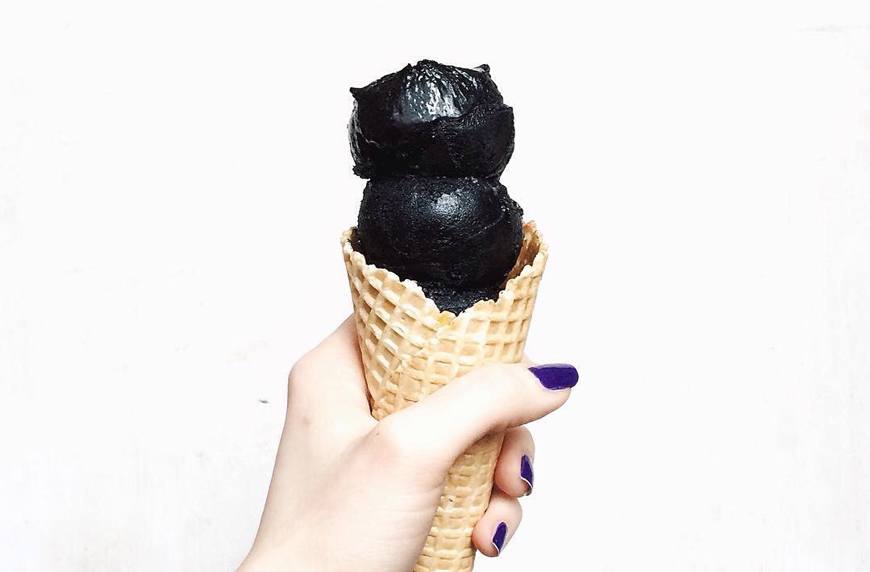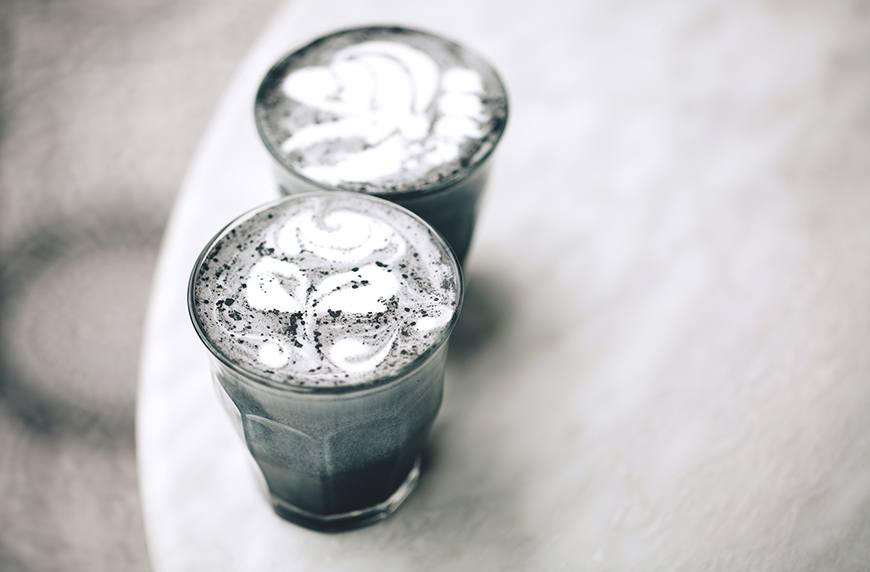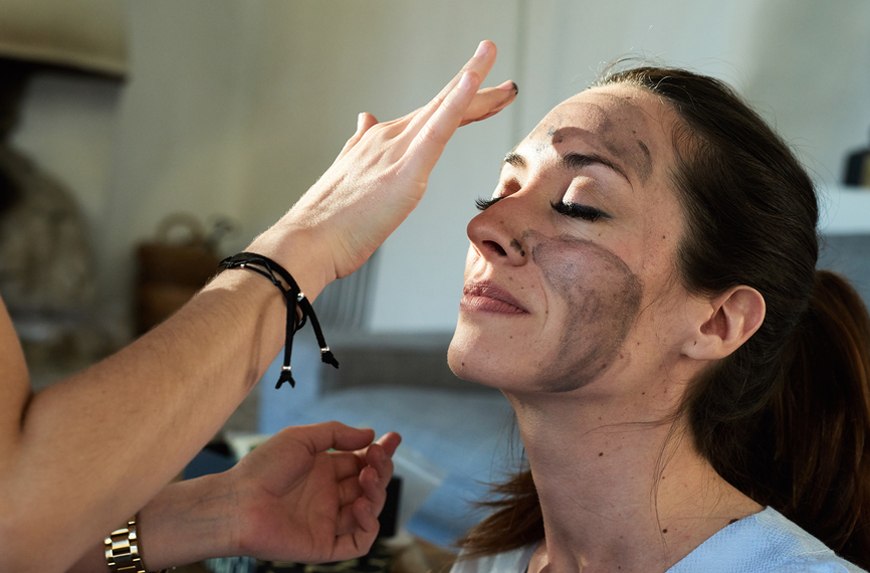Activated Charcoal Is *Everywhere*—but Is It Safe? Here’s What You Need to Know
But here's the thing: The ingredient isn't regulated by the Food and Drug Administration, which understandably might make you think twice about lining up for your scoop of black ice cream. Here, two doctors give the inside intel on the origins of activated charcoal and explain exactly how it affects the body. Keep reading for the need-to-know facts.
Scroll down to find out if activated charcoal is actually safe to consume.

From the ER to PR
Long before activated charcoal started popping up in your food, it was used in emergency rooms—and still is. "It's very absorbent, so it's been used in the medical field for years in situations like poisoning or overdose," explains Shilpi Agarwal, MD. The carbon in the charcoal acts as a natural binder, attracting other substances it comes into contact with in the gastrointestinal tract and preventing them from being absorbed into your system. "We give patients activated charcoal because what it does is find everything in the stomach and absorb it before the body does and [the toxic chemicals] get into the bloodstream," Dr. Agarwal explains.
Since it is a detoxer, many people in the wellness industry started adding it to their products and marketing it as such. The idea touted on labels: Because the charcoal works like a sponge, it'll soak up any junky ingredients you've consumed so they won't affect your body. How legit is the claim? Dr. Agarwal says it could help you absorb fewer of the chemicals you're ingesting, but it could also soak up the good-for-you nutrients in your system—the charcoal isn't picky. But more importantly, Dr. Agarwal says there likely isn't enough activated charcoal in the food to do much of anything at all.
There likely isn't enough activated charcoal in the food to do much of anything at all.
Research also is firm on the fact that activated charcoal (at a medical dose) is only affective within one hour of consuming the toxic material. "If you spent the weekend eating junk food and take an activated charcoal elixir on Monday to undo the damage, that junk food is likely long gone [from your system]," Dr. Agarwal says.
To this point, using activated charcoal to cure your hangover (another popular use you'll find with a quick Google) all comes down to timing. When you chug a Daily Detox Dirty Lemon alongside your avocado margarita, you'll get less drunk (because it absorbs some of the alcohol before it hits your bloodstream) and will therefore be less hungover the next day. But if you take it the morning after, it's too late to do much good. (You should note also that alcohol is known to weaken the effect of activated charcoal—so if you're imbibing, it also likely won't work for its intended medicinal purpose should you ingest something poisonous.)
People in wellness circles also turn to activated charcoal to help with GI issues like gas and indigestion, but research to support this is dodgy. While a 2011 study of 276 patients found that activated charcoal in combination with simethicone (the active ingredient in de-bloating drugs like Mylanta) and magnesium oxide was effective at quelling indigestion, the results have not been replicated in larger studies. In fact, Consumer Reports points out that vomiting occurs in as many 20 percent of patients who take activated charcoal, meaning the ingredient could leave you with the opposite of a settled stomach. And if you're prone to constipation, you definitely want to steer clear—adding a binding agent to an already-sluggish digestive system is definitely a no-go (literally).

Danger warnings you won't find on the label
What's more, Dr. Agarwal says it's important to know that what's given in the ER is medical-grade activated charcoal and is regulated by the FDA—but the food-grade activated charcoal brands use is not. Earlier this month, New York City's Department of Health went so far as to start cracking down on activated charcoal in foods served at restaurants. In a statement reported by Eater, the DOH said the ingredient was banned (and has been since 2016, although it's only now enforcing the rule) because it's “prohibited by the U.S. Food and Drug Administration (FDA) as a food additive or food coloring agent.” The FDA clarified that activated charcoal is not prohibited—rather, it's currently unregulated.
Being outside the FDA's purview, there's a serious lack of clarity regarding where most activated charcoal comes from. "There is a lot of bad sourcing of [food-grade] activated charcoal," says naturopathic doctor Gabrielle Francis, DC. "There are sources like coconut shell and olive oil seeds, which are good, but many companies source it from petroleum. So there is a big sense of buyer's beware." And no, brands aren't required to list out where they are sourcing it from—and most don't.
Both Dr. Francis and Dr. Agarwal point out that activated charcoal is not just a magnet for the bad stuff in your body—as mentioned earlier, it can also absorb beneficial minerals and, more distressingly, can interfere with vitamins, prescription medications, and birth control, if you're consuming it within 30 minutes. (It should be noted, however, that only one scientific study have been done specifically on charcoal's effects on birth control, and it was inconclusive.) Gastroenterologist Patricia Raymond, MD, tells Insider that a little bit of the ingredient—like in a latte or ice-cream—likely won't entirely make your meds ineffective, but still, why take a chance, right?

What about using activated charcoal on the outside of your body?
One place activated charcoal does work well is in the kitchen, as part of a water filtration system. "In these filtration systems, it pulls out the toxins in the water and then goes through another stage so you're not actually consuming the activated charcoal at all," Dr. Francis explains. "Many use carbon blocks, which don't take out the good minerals in the water—only the bad."

{{post.sponsorText}}
Dr. Agarwal, meanwhile, recommends that people wanting to try the trend check out the beauty aisle. "The dermatologist and skin experts I spoke with say that it does help pull out impurities and can also help mattify oily skin," she says. "And if you do a charcoal face mask, for example, it's not going to be absorbed by your whole body like ingesting it would."
Next to the beauty aisle, you might come across activated charcoal in your toothpaste. To find out if this growing trend has merit, researchers studied the 50 most popular oral hygiene products available for sale and conducted clinical trials for three months on all of them. Unfortunately, no one ended up with whiter teeth as promised and some even saw a negative impact, including enamel abrasion. Like food, this seems to be another category where charcoal seems to be overrated.
The verdict on this one: Although consuming small amounts likely won't harm you—it probably won't do much good either. Instead, rely on your kidneys and liver for detoxing—that's their job!
This guide gives tips on safer ways to detox. And these six foods help detox the food and liver, too.
Loading More Posts...